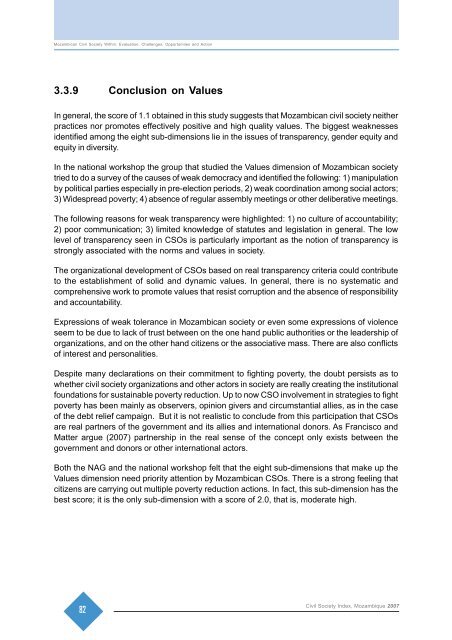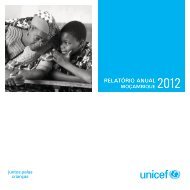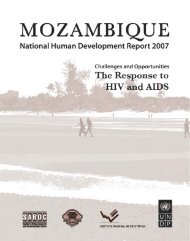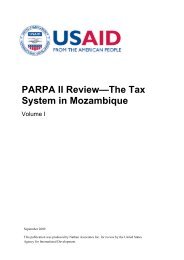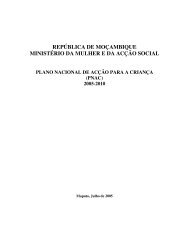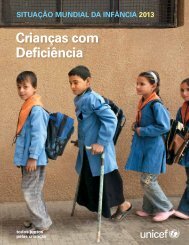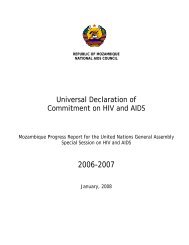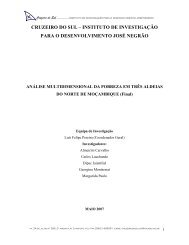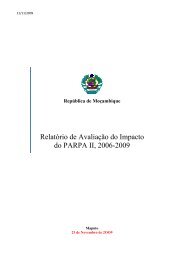Mozambican Civil Society Within: - UNICEF Mozambique - Home page
Mozambican Civil Society Within: - UNICEF Mozambique - Home page
Mozambican Civil Society Within: - UNICEF Mozambique - Home page
You also want an ePaper? Increase the reach of your titles
YUMPU automatically turns print PDFs into web optimized ePapers that Google loves.
<strong>Mozambican</strong> <strong>Civil</strong> <strong>Society</strong> <strong>Within</strong>: Evaluation, Challenges, Opportunities and Action<br />
3.3.9 Conclusion on Values<br />
In general, the score of 1.1 obtained in this study suggests that <strong>Mozambican</strong> civil society neither<br />
practices nor promotes effectively positive and high quality values. The biggest weaknesses<br />
identified among the eight sub-dimensions lie in the issues of transparency, gender equity and<br />
equity in diversity.<br />
In the national workshop the group that studied the Values dimension of <strong>Mozambican</strong> society<br />
tried to do a survey of the causes of weak democracy and identified the following: 1) manipulation<br />
by political parties especially in pre-election periods, 2) weak coordination among social actors;<br />
3) Widespread poverty; 4) absence of regular assembly meetings or other deliberative meetings.<br />
The following reasons for weak transparency were highlighted: 1) no culture of accountability;<br />
2) poor communication; 3) limited knowledge of statutes and legislation in general. The low<br />
level of transparency seen in CSOs is particularly important as the notion of transparency is<br />
strongly associated with the norms and values in society.<br />
The organizational development of CSOs based on real transparency criteria could contribute<br />
to the establishment of solid and dynamic values. In general, there is no systematic and<br />
comprehensive work to promote values that resist corruption and the absence of responsibility<br />
and accountability.<br />
Expressions of weak tolerance in <strong>Mozambican</strong> society or even some expressions of violence<br />
seem to be due to lack of trust between on the one hand public authorities or the leadership of<br />
organizations, and on the other hand citizens or the associative mass. There are also conflicts<br />
of interest and personalities.<br />
Despite many declarations on their commitment to fighting poverty, the doubt persists as to<br />
whether civil society organizations and other actors in society are really creating the institutional<br />
foundations for sustainable poverty reduction. Up to now CSO involvement in strategies to fight<br />
poverty has been mainly as observers, opinion givers and circumstantial allies, as in the case<br />
of the debt relief campaign. But it is not realistic to conclude from this participation that CSOs<br />
are real partners of the government and its allies and international donors. As Francisco and<br />
Matter argue (2007) partnership in the real sense of the concept only exists between the<br />
government and donors or other international actors.<br />
Both the NAG and the national workshop felt that the eight sub-dimensions that make up the<br />
Values dimension need priority attention by <strong>Mozambican</strong> CSOs. There is a strong feeling that<br />
citizens are carrying out multiple poverty reduction actions. In fact, this sub-dimension has the<br />
best score; it is the only sub-dimension with a score of 2.0, that is, moderate high.<br />
82<br />
<strong>Civil</strong> <strong>Society</strong> Index, <strong>Mozambique</strong> 2007


